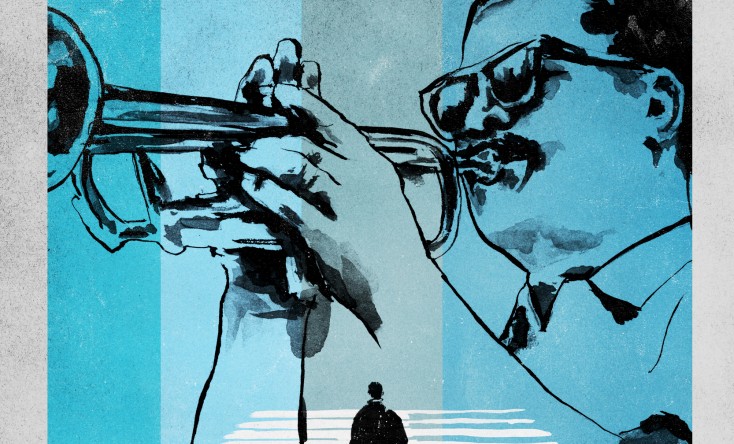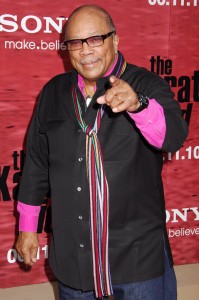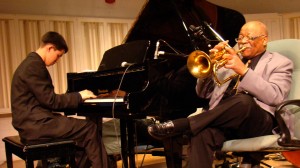By ANGELA DAWSON
Front Row Features
HOLLYWOOD—Music impresario Quincy Jones holds the record as the most Grammy-nominated artist of all time with a total of 79 nods and 27 wins. Steeped in the world of jazz and pop, he has worked with and known all the greats. Among his notable achievements, he produced Michael Jackson’s “Thriller.” His fame extends far beyond music and he is known and revered around the world. Through his travels, he speaks several languages and has been honored for his contribution to the arts here and abroad.
In addition to his storied music career, Jones, 81, is a film producer, publisher, multimedia entrepreneur and humanitarian. Six decades into his career, he shows no signs of slowing down. He recently completed a six-nation tour with his Global Gumbo All-Stars, and he’ll be back on the road soon.
He recently slowed down long enough to talk about a documentary he produced called “Keep On Keepin’ On.” While the title could very well describe him, instead it is about one of his oldest friends and mentor Clark Terry. The 93-year-old is a living legend. He played trumpet in both Duke Ellington’s and Count Basie’s orchestras. He broke the color barrier as the first African-American staff musician at NBC on “The Tonight Show.” He also was a mentor to the late great Miles Davis and hundreds of other musicians over the years.
Jones was only going to be one of the many luminaries to talk about Terry for the documentary, but once he saw what first-time filmmaker Alan Hicks, a former student of Terry’s, and his team were trying to do, he stepped in to lend his considerable clout to get the movie made.
More than just a straight documentary about Terry’s life as an incredible jazz musician, “Keep On Keepin’ On” (a signature Terry salutation), tells the story of his valiant effort to cope with the crippling effects of diabetes, and how he continues to mentor young musicians from his Arkansas home, even though he no longer can perform himself.
One young musician, in particular, a blind pianist named Justin Kauflin, became not only a student of Terry’s but a close friend and kindred spirit, who goes through his own challenging journey of trying to achieve his dream of becoming a professional jazz musician. As it turns out, Jones sees Kauflin’s special musical talent as nurtured by Terry, who also was his own mentor when he was a young musician. He recently brought the young musician on his Quincy Jones’ Birthday Celebration World Tour last year, and he signed the pianist to deal at Quincy Jones Productions and is currently working on recording a new album.
Dressed in a grey suit accented by a colorful scarf, Jones speaks in jazz, jumping from one note to another, as he recalls events and people who shaped his life.
Q: This documentary has all the drama of a narrative feature but it is even more moving because it’s true.
Jones: I’ve never seen so much truth in my life than what is up on the screen. And, it’s organic. What kills me is how it happened. It blows my mind. Al Hicks, an Australian, just started to shoot. He was a student of Clark’s, and he started to shoot 350-450 hours, with Adam Hart, a great cinematographer, and just one thing led to another. And then Paula (Dupre’Pesmen, the producer, who previously shepherded “Chasing Ice,”) came in. Clark Terry was my teacher 68 years ago, and he was Miles (Davis’) teacher. it’s just ridiculous, you know. In 1959, (Clark Terry) and Quentin Jackson left Duke Ellington’s Band and joined my band in Paris. They had worked with my idol and my guru and my god: Duke Ellington. I had promised (Count) Basie that I would never steal his musicians but with Duke Ellington I didn’t care. So it’s just like a miracle. It all comes together like this and then this terrorist (referring to young Kauflin) comes in and the pimp (Kauflin’s guide dog Candy). It’s just beautiful, though. You couldn’t write this if you tried.
Q: You came onboard this project towards the end as a producer, right?
Jones: Yeah. I came over to Arkansas to do a record with Clark and Snoop Dogg, with “Mumbles” (Terry’s signature song) on a rap record. I’d been dying to do that because it fits and all. They both came from St. Louis. I used to go there when I was a kid. Snoop didn’t show up and so Clark and me just carried on. I met (Kauflin) there—a beautiful, talented soul. This wasn’t planned; that’s why there’s so much truth in it.
Q: Besides Terry, who else did you look to for inspiration as a young musician?
Jones: I had Basie and Ray Charles, and people like that. That happens to you automatically. You can’t help it. Basie adopted me when I was 13, and Clark (later on). It’s crazy. It shows you how little we have to do with our life, these coincidences. It’s God’s way of remaining anonymous.
Q: I’m surprised Clark still has the passion to make music after his legs were amputated. Music seems to be a powerful force in his life. Do you feel that way about music?
Jones: It does have the power. It’s left and right brain. We tried to deny that it was connected with mathematics. But I went to (Boston’s) Berklee College of Music with Joseph Schillinger. Somehow, there is just this amazing relationship between mathematicians and musicians—the binary, trinary numbers. I didn’t want to admit it at first, because it sounded too mechanical to me. It’s not. There are as many tricks with mathematics as there are with music. Mike Milken has taught me a lot of those. It’s amazing stuff.
Q: When we see Terry in the hospital going through the treatment for his diabetes, and yet his spirits remain high, it’s quite inspiring.
Jones: It goes along with God’s word: Love, laugh, live and give. I remember he told me that at first he turned Miles (Davis) down (as a student) and he felt bad about it, because he taught me and then he went back to Miles, and all these years later, 60 years later here he still is—a brother.
Q: It’s interesting that so much of the conversations he has with Justin are in the middle of the night…
Jones: Yeah, that’s jazz life.
Q: Mr. Jones, when did you…
Jones: Quincy, please. I’m 81. You make me sound old.
Q: You’re 81 now?
Jones: (nods his head) I don’t believe it, man. Our generation didn’t live past 34. Charlie Parker died at 34. It’s heavy.
Q: You were Clark Terry’s first student. How long did you pursue him before he agreed to take you on?
Jones: Not long. What used to happen was there was a theater called the Palomar Theatre in Seattle. I used to play hooky; this was before TV. The only way we could connect with the (jazz musicians) back east and learn what all the new licks was—Charlie Parker, Thelonious Monk—we’d just quiz them to death to find out what was happening. Charlie Parker would put all this stuff in—all this crazy stuff.
Q: You know and knew everybody who was anybody in jazz.
Jones: It’s a very close family in the jazz world. Even the people that were thousands of miles away, they all know each other. There are only 12 notes, you know. (He chuckles.) Everywhere in the world they know everything that’s going on. As soon a record comes out, they’ll know what’s going on. I’ve been traveling the world for 68 years and it’s astounding to see (the appreciation of jazz around the world). But you gotta go to know. We wouldn’t have jazz had it not been for the French. That’s for sure, even during slavery. The whole southern delta, they killed all of the arts and broke up the families. But in New Orleans, the mulattos came over as servants of the French and built a conservatory. In 1865, when the Africans were freed, they had vocal and polyrhythmic skills. They’d never seen clarinets, trumpets or trombones. The mulattos thought they were better than the Africans. But then Jim Crow (laws) said, “You’re all black,” and put them together, and they had to sit across the hall from the Africans and try to make those instruments sound like voices, because if it doesn’t bend, you’re not in. (He chuckles.) They had to (makes trumpet sounds) with toilet plungers, anything, to build that language and all. That was a language that nobody had heard before, so you can imagine (Igor) Stravinsky—I met him when I studied with (Nadia) Boulanger—imagine Stravinsky when he first heard (makes a rat-tat-a-tat cymbal sound). There were all these sounds that people who were involved with music had never heard before. They knew this was the stuff. It took a long time for it to spread, but boy, it has spread, all over the planet, all the way to Indonesia, Abu Dhabi, everywhere.
Q: What was the most important lesson you learned from Clark Terry?
Jones: It was a very simple trumpet technicality. I was 13 and I played the trumpet, but I always played from inside like this (he demonstrates on his hands). So when I met Clark, I told him, “My lips bleed when I play,” and he said, “No, turkey, put it up here.” (Higher up on his lip.) It’s endless, the things that (Clark) teaches. You never know where it’s going to come from.
Q: Are you still touring?
Jones: Always. We just came back after playing six countries in Europe. I’ve been touring all my life so I just believe you’ve got to go to know. That’s how I learned all those languages. One of my biggest pet peeves is that America is the only country without a minister of culture. The culture is the music, the food and the language. You can see why Miles (Davis) and Sam Getz recorded in 1949 in Stockholm. Music pulls cultures together.







